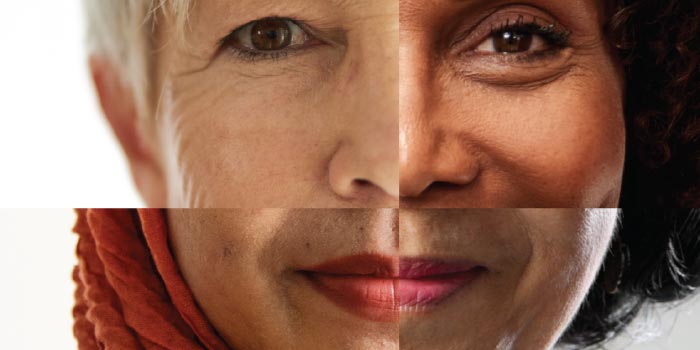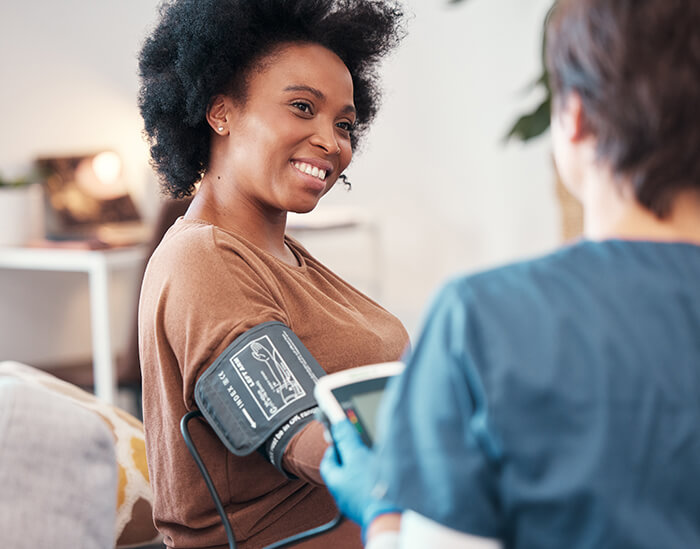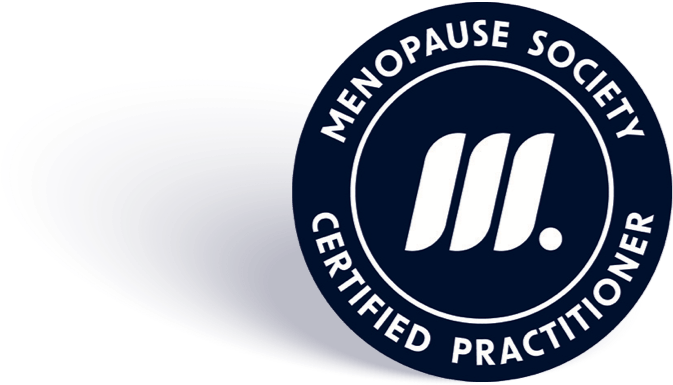Sexual Health | The Menopause Society (original) (raw)
Menopause Topics:
Sexual Health is important to one’s overall sense of self and well-being.

Sexual health is important to one’s overall sense of self and well-being, but it is important to note that there is no standard to meet when it comes to sexual activity and desire. Some experience a significant decline in desire at midlife, some have an increased interest, and others notice no change at all. Only you or your partner can know whether your sex life meets your needs.
Sexual Dysfunction
Sexual dysfunction can be a major disruptive force. There are four areas in which this may occur: sexual desire, arousal, orgasm, and sexual pain. These problems frequently overlap—for example, someone who doesn’t experience sexual desire may also experience difficulty with arousal or having an orgasm.
- Sexual desire: Reduced production of estrogen at menopause causes hot flashes and night sweats. Not having restful sleep might reduce interest in sex. Falling estrogen levels result in vaginal dryness and thinning vaginal lining, making penetrative sex painful.
- Hormone changes: These are only part of a complex set of factors that influence sexual activity at midlife and beyond. Social changes, such as changing partners (divorce, dating), children leaving home, adult children living at home, or the need to care for aging or ill parents, often take place at this time.
- Partner sexual problems: These might also affect desire and factors such as changes in body image and self-esteem as well as concerns about aging. Sexual interest after menopause also depends on your past level of sexual interest.
Medical problems: These may result in low sexual desire. Some medications, such as those used to treat depression, can interfere with sexual function.
Sexual Challenges
Beyond sexual desire, there are three other categories of sexual problems for women:
- Difficulty with arousal: Some women may find themselves unable to develop or maintain genital arousal.
- Difficulty with orgasm: Whether a new development or a lifelong concern, some women may struggle to experience an orgasm.
- Sexual pain: Pain can be caused by a number of factors. If caused by vaginal dryness, lubricants and vaginal moisturizers can help maintain moisture and reduce friction. Low-dose vaginal estrogen therapy (ET) is also an option.
Seeking Help
Understanding these factors and sharing one’s sexual concerns with a healthcare professional can improve desire and sexual satisfaction. An evaluation by a professional can help identify any underlying medical or psychological causes of low sexual desire. Although many find it difficult to discuss their sexual problems, healthcare professionals are a good resource to help achieve optimal sexual health. Counseling can help in coping with difficult medical, relationship, or family issues contributing to sexual health concerns. Healthcare professionals also may help by referring you to clinicians who specialize in treating sexual concerns.
Find a Menopause Society Certified Healthcare Practitioner
Drug Therapy
Many sexual problems can be successfully treated with prescription therapies.
- Estrogen: Some women with vaginal dryness or pain with sexual activity may benefit from prescription ET, either low doses applied directly to the vulva and vagina or higher doses taken systemically. Systemic ET affects the whole body, providing relief not only from vaginal dryness but also from hot flashes and night sweats.
- Intravaginal dehydroepiandrosterone: Intravaginal dehydroepiandrosterone is a local vaginal therapy that is beneficial for treating sexual pain caused by vulvar and vaginal changes related to menopause.
- Ospemifene: The nonhormone oral medication ospemifene (a selective estrogen-receptor modulator) is approved to treat symptoms of genitourinary syndrome of menopause, thus alleviating vaginal dryness and pain associated with sexual activity.
- Flibanserin: This medication is approved in the United States and Canada to treat low sexual desire in premenopausal women. It works by reducing serotonin activity and increasing the activity of dopamine and is taken daily at bedtime.
- Bremelanotide: This nonhormone medication, delivered via an auto-injector (like an EpiPen) is approved in the United States to treat low sexual desire in premenopausal women.
- Testosterone: There is evidence that testosterone may help with low sexual desire in both perimenopausal and postmenopausal women. Adverse events such as acne and facial hair growth may occur, and long-term risks are still being investigated.
Treatment of a partner’s sexual problems may be important to improving a woman’s sexual function and satisfaction.
Practice Safe Sex
Sexuality doesn’t—and shouldn’t—end with menopause. Still, even with advancing age, safe sex is critical. After menopause and without the risk of pregnancy, it’s easy to let protected sex slide. But anyone who is not in a long-term, monogamous relationship and has unprotected sex is at risk of sexually transmitted infections (STIs). You need to be aware of the many infections you can get and take the necessary precautions. Postmenopausal women are especially vulnerable to STIs because having fragile vulvar tissues can allow these viruses to enter the body more easily.
Frequently Asked Questions
What changes should I expect after menopause?
With menopause, the ovaries stop making estrogen, which can cause your vagina to become dry and less elastic or “stretchy.” Fortunately, low doses of vaginal ET can keep the lining of your vagina healthy. For some, regular use of long-acting vaginal moisturizers when combined with regular vaginal sexual activity helps. Regular vaginal sexual activity is important for vaginal health after menopause because it stimulates blood flow, helps keep your vaginal muscles toned, and maintains your vagina’s length and stretchiness.
My partner and I haven’t had sex in years. Is this abnormal?
Although many couples enjoy sex in their older years, there is absolutely no “normal” frequency for having sex at any age. If there’s no conflict around sex in your relationship and the relationship is loving and intimate in other ways, there is nothing to be concerned about.
Can hot flashes be affecting my libido?
Bothersome hot flashes, especially if they are associated with night sweats and sleep disruption, certainly could affect sexual interest. When your overall quality of life is poor and you are tired from rustling the covers all night, sleep may take priority over sex.
Videos & Podcasts
The Menopause Society is proud of its comprehensive video series for women and healthcare professionals on important midlife health topics.
View the entire video & podcast series
Discussing Sexual Health Concerns With Your Healthcare Professional
Dr. Sheryl Kingsberg
Discussing Sexuality and Menopause With Your Patients
Dr. Holly Thomas
Treatment Options for Vaginal Dryness and Urinary Issues
Dr. Stephanie Faubion
Additional resources on this topic

Menopause Guidebook
The Menopause Guidebook is the most complete and current discussion of menopause available anywhere.

Choosing a Healthcare Practitioner
Taking an active role in your menopause journey and find the right healthcare profressional for you.

MenoNote on Vaginal Dryness
MenoNotes are free information sheets written by menopause experts that provide clear, easy-to-understand explanations of important menopause-related topics.
Other menopause topics

Symptoms

Heart Health

Hot Flashes

Mental Health

Need help finding a certified menopause practitioner?
The Menopause Society’s website offers a searchable listing of healthcare professionals including those who have earned the prestigious Menopause Society Certified Practitioner (MSCP) credential. Start your search for a certified menopause practitioner today.
Start your search for a certified menopause practitioner today.